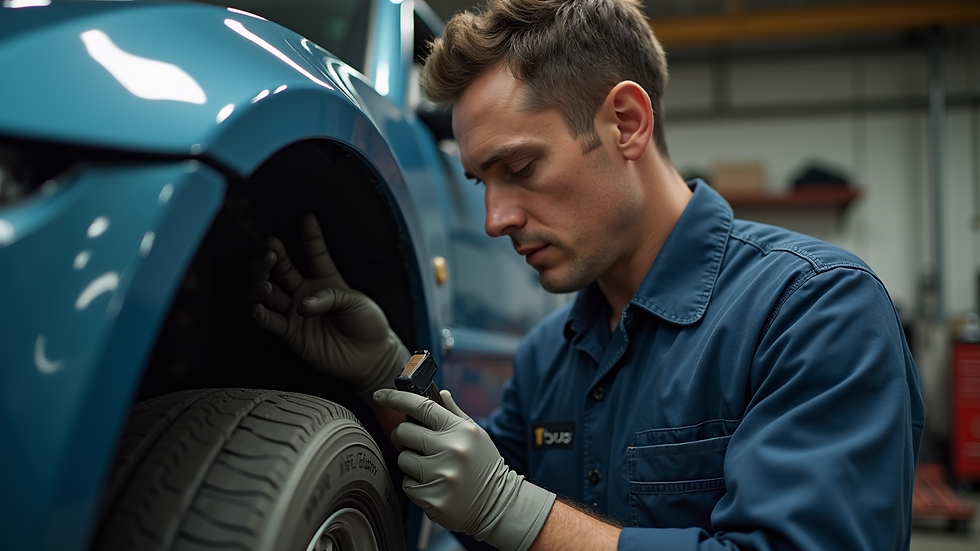Why Proper Vehicle Repair After a Collision Is Vital for Safety and Longevity
- Sean Ryder
- Nov 4, 2025
- 4 min read
Experiencing a vehicle collision can be overwhelming, leaving car owners with difficult choices regarding repairs. While it may be easy to choose the quickest or cheapest option, understanding the critical importance of proper vehicle repair is essential for ensuring both safety and long-term performance. This decision affects not only the vehicle’s reliability but also the safety of everyone on the road.
Understanding the Impact of a Collision
Even seemingly minor accidents can cause extensive damage that isn’t immediately obvious. For instance, after a low-speed collision, issues such as frame misalignment or hidden internal damage may occur. A 2021 study showed that 20% of vehicles involved in such accidents had structural compromises that were difficult to detect without expert evaluation.
Many vehicle owners mistakenly assume that if their car runs smoothly, all is well. However, hidden damage can severely compromise safety. For example, a damaged airbag sensor due to a collision might fail to deploy in a future accident, drastically increasing the risk of injury.
The Role of Certified Technicians
Certified technicians play an essential role in the repair process. They possess specialized training that enables them to accurately assess vehicle damage and recommend the most effective repairs. Utilizing their expertise is vital for addressing the complexity of modern vehicles, which often include advanced safety features.
Choosing a certified repair shop ensures that work is carried out to industry standards. According to a survey by the Automotive Service Association, vehicles repaired by certified technicians retained 15% more of their resale value compared to those repaired by unauthorized shops. This highlights the financial benefits of opting for professional services.
Safety First: The Importance of Structural Integrity
Structural integrity is a key safety factor. A vehicle that hasn’t been adequately repaired is less likely to withstand impact during another collision. For example, if a vehicle's frame is not restored to its original specifications, it might collapse under stress, endangering the occupants inside.
Restoring a vehicle's body requires specialized equipment and training. Only certified repair shops possess the necessary tools to ensure that frame and body integrity is properly maintained. This preservation of structure is more than cosmetic; it directly contributes to the safety of all passengers.
The Consequences of Poor Repairs
Choosing low-cost or inexperienced repair options can lead to serious repercussions. Aside from the risk of additional safety hazards, poor repairs may cause mechanical issues in the future. For instance, improperly aligned components can lead to uneven tire wear, reducing tire life by up to 30% and negatively impacting fuel efficiency.
Moreover, if the repairs are found to be substandard, insurance companies may deny coverage for claims related to those repairs. This can mean significant out-of-pocket expenses for car owners who may be left with an unsafe vehicle and a heavy financial burden.
The Importance of OEM Parts
Using Original Equipment Manufacturer (OEM) parts is crucial to proper vehicle repair. These parts are manufactured to match the exact specifications for your vehicle, ensuring a correct fit and reliable performance.
While opting for aftermarket parts might save money upfront, it can lead to long-term issues. For example, studies indicate that vehicles using OEM parts experience 10% fewer problems in the long run compared to those with aftermarket alternatives. Furthermore, some warranties can be voided if non-OEM parts are used, putting extra financial strain on vehicle owners.
Enhancing Longevity Through Proper Repairs
Proper vehicle repair not only enhances safety but also contributes to the vehicle’s longevity. Quality repairs can significantly improve the vehicle’s performance over time, reducing the likelihood of recurrent issues. For instance, regular maintenance combined with high-quality repairs can add years to your vehicle's lifespan, allowing owners to enjoy their vehicles with minimal worry.
Moreover, statistics show that vehicles in good repair can maintain their efficiency, often achieving better fuel economy and reliability. A well-maintained vehicle can often last over 200,000 miles, compared to 150,000 miles for those that receive insufficient care.

The Emotional Aspect of Vehicle Repair
The emotional side of vehicle repair is significant as well. For many, a vehicle represents more than just transportation; it symbolizes freedom and independence. Thus, driving a vehicle that has not been properly repaired can be anxiety-inducing for owners.
Knowing that repairs were conducted correctly can greatly enhance peace of mind. When car owners feel secure in their vehicle, they are more likely to enjoy the driving experience again, restoring a sense of normalcy after an unsettling event.
Final Thoughts
Repairing a vehicle properly after a collision is crucial for various reasons, including safety, structural integrity, and vehicle longevity. High-quality repairs not only enhance safety but also maintain value and minimize future issues.
Investing in certified technicians and OEM parts is essential, not just for financial reasons, but as a commitment to safety. Quality repairs ensure that both drivers and passengers are protected on the road.
Next time you encounter a collision, take the necessary steps to find a reputable repair shop that prioritizes quality and safety. Your vehicle and your well-being deserve the highest standards of care.




Comments